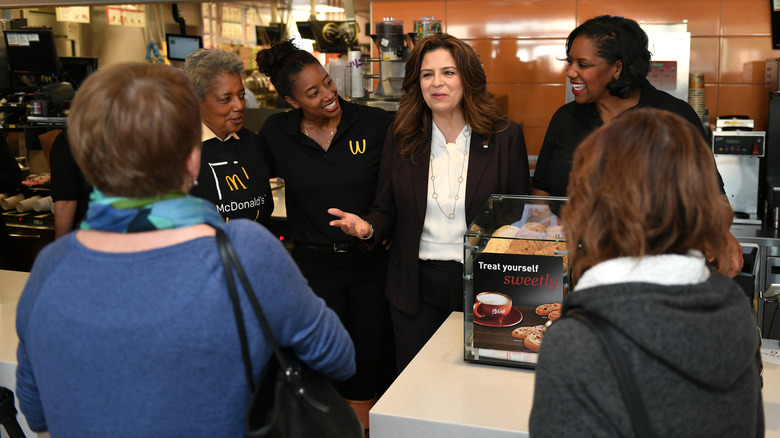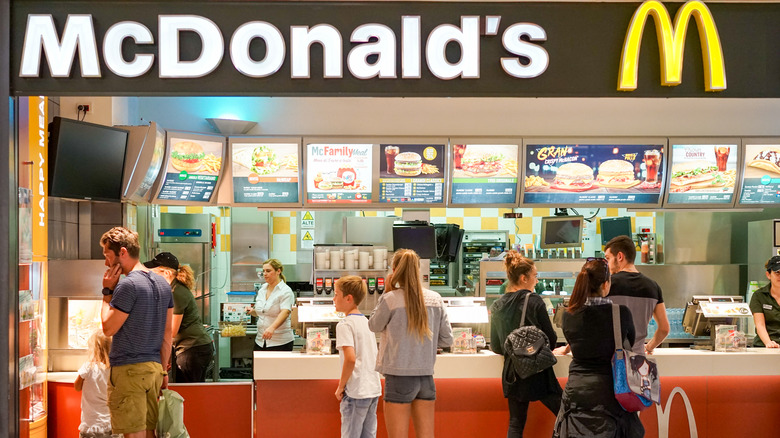The Huge Way McDonald's Is Changing Its Franchise Policies
Some might consider McDonald's to be a gift to fast food, but the franchisees who own and operate McDonald's restaurants may not feel the same way. In 2014, when franchisees were asked to describe their relationship with the McDonald's corporate mothership one a scale of 1 to 5, the average rating was 1.94, which Insider says was well "below the survey's historical average of 2.2."
A year later, one former franchise owner revealed some possible reasons behind these low ratings. In an interview with The Guardian, former franchisee Kathryn Slater-Carter shared that she had originally inherited two McDonald's restaurants from her father, but was forced to close one because McDonald's suddenly decided not to renew the property lease. Slater-Carter and her husband eventually sold the second store, fearing history would repeat itself.
Running a franchise is not cheap. Slater-Carter said her family paid McDonald's royalty fees of 3%, advertising fees of 5%, and rent of about 12.5%. On top of that, franchisees like Slater-Carter are required to pay for remodeling costs, which are necessary for franchise agreement renewals. These financial requirements affect how much McDonald's franchise owners make per year, leaving them with what Slater-Carter said are slim profits with little opportunity to cover rising wages.
Seven years later, the relationship between McDonald's and its franchisees often remains tense, especially amid recent changes announced by the corporation.
McDonald's changes its franchisee renewal structure
The Wall Street Journal reports that McDonald's recently told its franchise owners "that they will have to go through a more stringent review every 20 years to keep their restaurants." Every two decades, franchisees will need to send the corporation an application to maintain ownership of their restaurants, reviewed by the corporation based on factors like customer feedback. These changes were detailed in an email sent to franchisees and shared on McDonalds' corporate website.
Additionally, McDonald's is expecting those who inherit their franchises — as Slater-Carter did — to "put up more cash to keep operating their locations," per the Journal. Those who inherit a franchise also need to name a single family member (rather than multiple children, for example) to take over as the restaurant's new operator. McDonald's says these updates are "in keeping with the principle that receiving a new franchise term is earned, not given." They are set to take effect in January of next year, and, according to the company's announcement, are part of McDonalds' plans to increase franchise owner diversity and create a more "positive work environment for restaurant teams."
The relationship between McDonald's and its franchisees has been tense
The McDonald's Corporation's relationship with its tens of thousands of franchisees, who run 93% of the chain's 38,000 locations, has long been tumultuous. At the end of 2020, Restaurant Business reported that McDonald's operators vehemently resisted the company's announcement that franchisees would temporarily be required to pay the corporation $12,000 each in "technology fees," meant to cover upgrades such as mobile ordering and new store equipment, in addition to royalty payments. The dispute over the announcement was resolved in June of 2021, when McDonald's cut the technology fees by 62% in efforts to "reset" its relationship with franchisees, per Bloomberg.
More recently, McDonald's franchisees were furious about a new company rule set in May of this year, subjecting restaurants to up to 10 "assessment visits" per year by corporate representatives. Operators complained that the grading system has arbitrary criteria, "kills morale," and is "tone-deaf" considering it has arrived in a difficult period for the restaurant industry (via CNBC).
Keith Miller, who operates a Subway, explained to Restaurant Business the general cause of discord between franchisees and franchisors: "Franchisees generally believe that their royalty payments should cover the services received and the reinvestment in the brand by the franchisor." When franchisors ask for more money, the relationship may feel less reciprocal. "Unless there is collaboration, there will be conflict," he went on.


